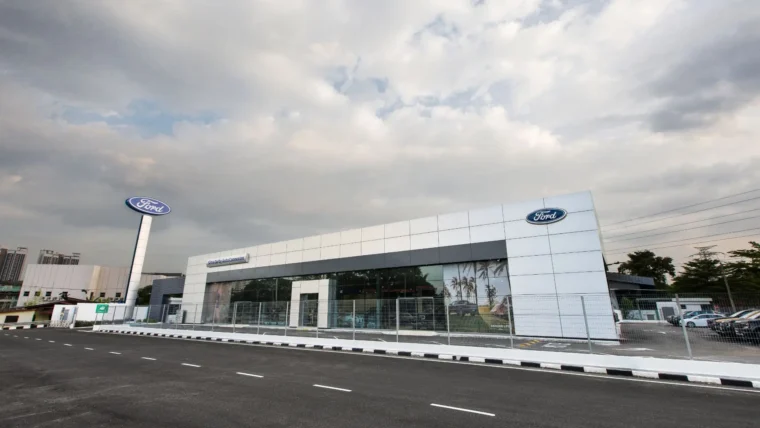Ford Motor Company, Uber and Lyft today announced an unprecedented commitment to SharedStreets, a new data platform designed to make it easier for the private sector to work with cities around the world and leverage data to improve urban mobility. The data sets pledged by the companies will provide the public and private sectors with new tools to manage curb space in order to reduce congestion and emissions that cause climate change; improve the efficiency of city streets by making it easier for everyone to get around, and save lives by preventing traffic crashes.
The groundbreaking public-private partnership is the result of a collaboration with the National Association of City Transportation Officials (NACTO), the Open Transport Partnership and Bloomberg Philanthropies, the consortium behind the innovative SharedStreets data platform. This collaborative effort to build 21st-century streets was announced by Jim Hackett, CEO of Ford Motor Company, Dara Khosrowshahi, CEO of Uber, and John Zimmer, Co-founder and President of Lyft at the second annual Bloomberg Global Business Forum in New York City. They were joined by Janette Sadik-Khan, principal at Bloomberg Associates and chair of NACTO, on behalf of Michael R. Bloomberg, the founder of Bloomberg Philanthropies and Mayor of New York City, 2002-2013.
The partnership gives mayors unparalleled access to road traffic data, allowing them to make better planning and investment decisions as shared and autonomous mobility arrive in their cities. The agreement also fills a long-missing link for mobility companies, providing a common standard for sharing data across all cities, where local requirements currently vary widely.
Launched earlier this year with funding from Bloomberg Philanthropies, SharedStreets is a universal data language for sharing information about city streets and a launching pad for public-private collaboration to manage streets, reduce traffic deaths, and prepare cities for the unprecedented technological advancement emerging in cities. Already operating in over 30 cities around the world, the SharedStreets platform and this new partnership will provide city leaders with far-reaching new instruments for managing transportation networks. The agreement includes:
- In partnership with Ford, developing a universal data standard for real-time curb demand and availability. With this tool, cities will be able to responsibly price and manage curb space in real-time, for the first time. It will provide a down payment on a global, comprehensive roadway pricing mechanism that cities and companies can use to encourage sustainable transportation choices, reallocate road space, and reduce carbon emissions.
- In partnership with Uber, producing the first-ever freely available global data set of vehicle driving speeds. Building on one of the first features developed by SharedStreets, Uber will release vehicle speed data from cities around the world. With this critical data, cities can identify where exactly on their streets people are speeding or otherwise driving dangerously so that they can redesign streets and save lives. Uber will include this speed in an update of its open-source Kepler.gl tool, providing cities everywhere with innovative new tools for data visualization and information sharing. Lyft will follow with a release their own city speed data set.
- Lyft will join SharedStreets and Uber to produce a universal framework for sharing curbside pick-up/drop-off counts. Building on an early SharedStreetsfeature first announced with Uber, Lyft will also collaborate on a model for providing anonymized, aggregated curb usage data to leading cities everywhere. With this model, city leaders can understand where for-hire vehicle trips are in the greatest demand so that they can reduce congestion, make our curbsides more innovative and efficient and better serve everyone on foot, on a bike or behind the wheel.
“This is a once in a lifetime opportunity for business and government to work together to rethink transportation,” said Jim Hackett, president and CEO, Ford Motor Company. “Collaborating through initiatives such as Shared Streets will enable us to use vehicles, road systems and data together to create a new roadmap for mobility. We are working toward a future where all cities are smart and curb space is actively managed, increasing efficiency and safety while reducing driver stress and pollution.”
“The private and public sectors need to come together and collaborate on ways to create smarter, safer and more efficient transportation systems,” said Dara Khosrowshahi, CEO, Uber. “It’s the responsibility of companies like ours to step up and support cities in every way we can—whether that’s through data sharing, urban planning research, funding for nonprofits, or even through the introduction of new and more efficient forms of transportation like electric bicycles.”
“Lyft is in a unique position to drive positive change within our cities, and we take that responsibility seriously,” said John Zimmer, President and Co-Founder of Lyft. “We are committed to partnering with cities and data-driven decision making to design streets that provide safe and accessible transportation for everyone. We look forward to collaborating with regulators to expand affordable mobility options, taking cars off the road and reducing congestion, and ultimately reshaping cities around people – not cars.”
“Ride-share and auto companies have been gathering an enormous amount of data on transportation and traffic. Now, cities will be able to use it to find new ways to manage congestion, reduce carbon emissions, prevent traffic crashes, and prepare for the arrival of autonomous vehicles,” said Michael R. Bloomberg. “It’s a great example of how governments and businesses can work together to solve tough problems and build a better world – and I want to thank all the companies that are taking part.”
“Code is the new concrete for 21st-century cities and we need a digital infrastructure to share data and create safer and more sustainable streets,” said Janette Sadik-Khan. “The SharedStreets platform offers cities and private sector players a powerful new data sharing tool to make that future possible.”
In addition to launching the new tools and partnerships, NACTO, representing 74 cities and transit agencies across North America, and global cities from Paris to Melbourne formally endorsed the data sharing policies of SharedStreets, committing to working collaboratively with the private sector. They join the six cities that have participated in pilots to develop new data standards and features or that have been formally trained on the platforms new tools and capabilities, together reaching more than millions of city residents around the globe.
Other posts by Mark Leo







